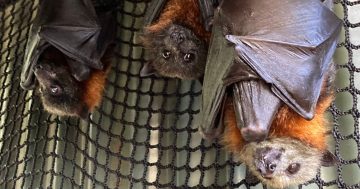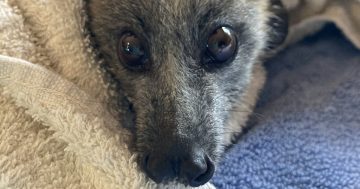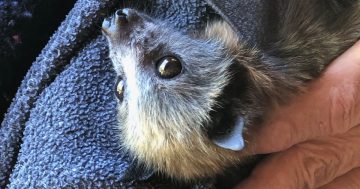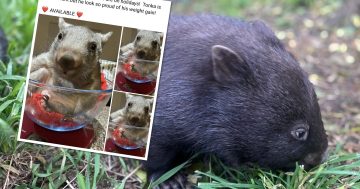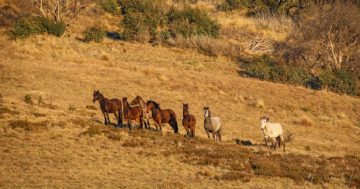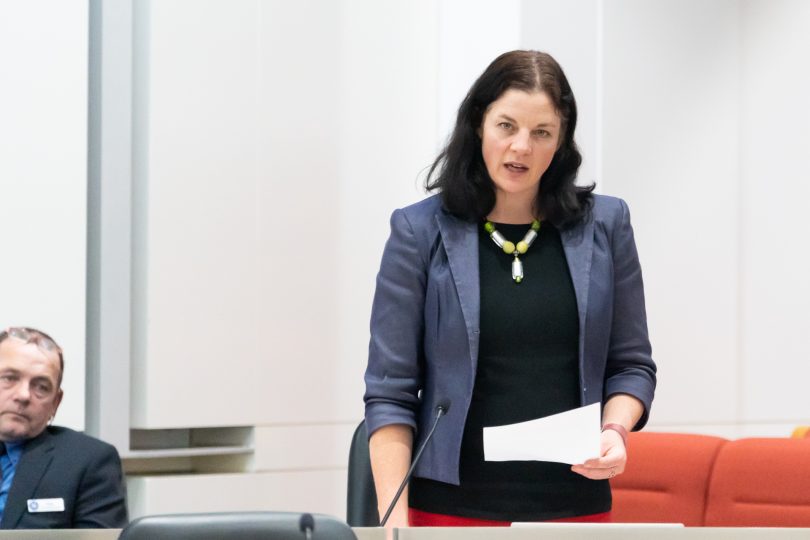
ACT Greens MLA Jo Clay has moved a private member’s bill to ensure stricter requirements on backyard netting. Photo: File.
In a move that’s been warmly welcomed by ACT Wildlife volunteers, new legislation on backyard netting will be introduced to better protect native wildlife such as flying foxes, possums, snakes and birds that can be injured or die if they become trapped in such material.
Long-time ACT Wildlife volunteer Denise Kay said volunteers were consistently finding animals such as flying foxes trapped in backyard netting. In fact, 71 of these animals were retrieved from backyard netting last year.
Rescuing them can be risky, Ms Kay noted, as volunteers have to be vaccinated and often have to climb trees to get them out.
She said it’s also upsetting for volunteers to see the bats in such pain. Many will die if they aren’t found for a number of days.

Roper is an injured flying fox, but it’s hoped he will recover well with care from ACT Wildlife. Photo: ACT Greens.
However, that hasn’t stopped the 73-year-old from doing what she can to save flying foxes from getting trapped in netting.
“At the moment the netting we are cutting bats out of is atrocious, we really want to see some decent netting on the market and assistance with the cost for people to change over,” Ms Kay said.
She also noted there was a lot of expense related to looking after an injured flying fox. Every adult bat consumes around 500 grams of fruit a day and then there is the cost of medication.
ACT Greens MLA Jo Clay moved a motion in the Legislative Assembly on Tuesday (23 November), where, once amended, it found tripartisan support.
The new legislation would ban the sale of netting that is not animal-friendly, she said.
Ms Clay told Region Media that many major retailers, such as Bunnings, already sell only animal-friendly netting, and she didn’t anticipate much pushback from others.
She also didn’t think any gardeners would have a problem with it.
“Canberrans love their wildlife and really, nobody wants to see animals hurt,” Ms Clay noted.
“It’s an unnecessary hurt,” she said.
An education campaign will also be run to teach people about which netting is indeed animal-friendly.
The animal-friendly netting has a narrower gauge than others available on the market – of no more than five mm by five mm – meaning wildlife is much less likely to be trapped.
Support will also be given to Canberrans to replace old netting with animal-friendly netting and to dispose of the old in an environmentally-friendly way.
The motion mirrors similar steps taken in Victoria this year.
Ms Clay said the ACT Greens, and indeed the entire ACT Government, valued animals as sentient beings who deserve to be free from direct and indirect harm.
“We want animals to be able to enjoy their lives, and to remove any obstacles that threaten their safety,” she said.
Ms Clay called for an implementation date of 1 January 2023 to allow plenty of time for the legislation and programs to be developed in consultation with the community and ACT Wildlife and to help residents make the transition.
Opposition environment spokesperson Leanne Castley had pushed for a phase-out date of June next year, however this was defeated. Ms Castley was highly critical of the six ACT Greens MLAs for not supporting this deadline.
Ms Clay, however, said the 2023 date would better allow for the legislation to pass in an appropriate manner.
ACT Wildlife volunteers can be reached 24-hours-a-day on 0432 300 033 for the rescue of any native animals, including flying foxes.












